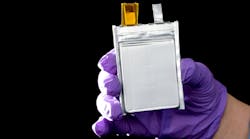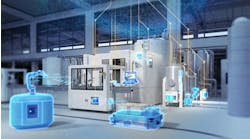The U.S. Dept. of Energy will loan $2.5 billion to the Ultium Cells LLC joint venture to support its construction of three lithium-ion battery cell manufacturing plants, according to a DOE spokesman. The money will come from the Advanced Technology Vehicles Manufacturing Loan Program, a $17.7-billion program chartered to support manufacturing of light-duty vehicles and qualifying components.
The same program previously made low-cost loans to Tesla Inc, Ford Motor Co., and Nissan, including some funding for electric-vehicle battery production.
Earlier this year DOE announced it would provide almost $3 billion in loans to accelerate production of advanced batteries, including battery materials refining and production plants, battery cell and pack manufacturing facilities, and recycling centers.
According to published reports, DOE’s director of the Loan Program Office, Jigar Shah, said: "We have to have vehicle manufacturing capacity but also battery manufacturing capacity. This project provides one of the newest additions to battery manufacturing scale in this country."
Shah added that the loan money would help the Ultium projects proceed faster toward their production goals
Ultium is a joint venture of General Motors and LG Energy Solution, which is building EV battery plants in Lordstown, Ohio, Spring Hill, Tenn., and Lansing, Mich., to manufacture “large-format, pouch-style cells (that) can be stacked vertically or horizontally inside the battery pack.” Each plant carries a reported cost of $2.3-2.5 billion.
The Ohio plant is scheduled to begin producing battery packs this summer, to be followed by the Tennessee plant next year and the Michigan plant in 2024.
In past statements, GM has indicated that a fourth Ultium Cells plant may be built to support its EV battery requirements.
GM claims the Ultium EV battery technology “provides the building blocks for everything, from mass-market to high-performance vehicles,” and reportedly can delivery 450 mile on a full charge.
The automaker also maintains that by 2025 Ultium packs will cost 60% less than the batteries in use today, with twice the energy density expected.






